- Home
- Jessie Haas
Working Trot Page 2
Working Trot Read online
Page 2
For the daughter of Tom and Marion MacLiesh, she wasn’t that hot a rider. She had a steady seat and light hands but did nothing with them, letting the mare jump as she pleased. This was with typical Morgan snortiness and exaggeration—ears pert and a triumphant toss of the head for every fence accomplished. It looked pretty, but unguided and careless.
Finishing, Gloria pulled up beside them, and James knew it was his turn. He circled Ghazal wide at the trot, assessing him and measuring the jumps. They were moderate and well within Ghazal’s ability, he hoped. He pointed the stallion at the first one and, sensing a sudden bubbling of enthusiasm, unleashed it. Ghazal’s quarters bunched. Two fierce, digging strides, and he exploded over the fence. His landing was awkward, but James steadied him, already looking to the next jump. This time he knew to take a firm hold, but Ghazal’s exuberance was difficult to contain. For those few strides just before each fence, he reminded James of Kubbadar.
Finishing in his turn, he brought the stallion up, blowing slightly, beside the girls. “He likes that! Has he done much jumping?”
“A little,” said Gloria. “He’s powerful, but Mom doesn’t think he could ever excel, because he puts too much energy into it. He erupts over a fence, where Dynasty used to just float.”
James nodded. That was probably true.
“I haven’t introduced you two. Jennifer Bascomb, this is James MacLiesh, my cousin.”
“I heard you were coming.” She had level brown eyes, a voice that already sounded professional, and a serious, plain face. She could be attractive, James thought. She carries herself well, has nice hair.…
“Come on,” said Gloria. “These guys need another mile or so under their belts, and then we have two more to do.”
James followed meekly, on a rambling circle that eventually led them back to the original trail. The land was hilly, rocky, very unlike the Connecticut countryside he was used to. There were unexpected rewards, though: topping a rise to see another farm on the next hill over, white house, red barn, cattle scattered down a sloping pasture; a dip into a gully, with a rushing brook at the bottom and young birches on the rim; the doe bounding away through the brush and Ghazal forgetting his dignity and trying to follow. For James, Vermont had been a place they passed through; he was glad he was going to like it.
Back at the barn he dismounted stiffly. Ghazal was turned into the stall, and James was given one of the summer projects, a spare brown gelding. Gloria saddled a dapple gray. “Go ahead of me,” she told James, “and don’t try to stop him till you get back here. If you do, he’ll flip over backward on you.”
Trying to conceal his misgivings, James mounted the brown horse. He held his neck stiffly and his ears were tense, whether with temper or fear James couldn’t tell. A strong dislike of the bit was certainly involved. The gelding responded to the barest touch of the reins, with disconcerting quickness. Once moving, he wanted to move fast, and his loose, sliding trot left the gray far behind. At the top of the hill James looked over his shoulder. The gray stood stock-still at the corner of the house, ears flattened obstinately, while Gloria plied heels and whip.
There was no stopping his own mount, so James continued uneasily. He found the jump field, and Jennifer pointed out the next path. From then on bewilderment set in. Nothing looked familiar, and the gelding was not stopping to let him figure things out. They came out into an unfamiliar field, on a sharp slope, and the gelding pounded downhill across it. James was bumped forward until he thought he would pitch over the horse’s head, but his one spasmodic clutch at the reins caused such a savage flattening of ears that he didn’t dare try again. At the bottom of the field a stone wall cut across their path. The gelding swerved and continued along it at the same headlong pace.
“James!” Gloria sat the gray at the top of the hill. “Not that way—you turn up here!”
He managed to indicate, tactfully, that they should head uphill. The effort of climbing slowed the gelding, and they continued at a more moderate rate.
Unlike Ghazal, the gelding came in hot and had to be walked. James exchanged bridle for halter, and the horse seemed to relax, lips uncrinkling and ears floppy. Suddenly James liked it. Gloria and Jennifer were picking out the stalls now, and as Gloria passed with a wheelbarrow, he asked, “What’s this fellow’s name again?”
“Ginseng.” Gloria continued toward the manure pile, then stopped reluctantly. “He was a nice show hunter; but he pulled, and somebody cut him up with a wire snaffle, trying to ‘cure’ him. So now he flips—literally—when you touch his mouth.”
James winced. The long brown face looked worn now, with the terror of carrying the bit, and a protective feeling surged up in James’s chest. He wanted to erase that look.
By the time Ginseng was cool the stalls were done and the girls were feeding. Consulting the list above the grain bin, James was able to feed two horses by the time they’d finished the rest. Then he helped Jennifer portion out the hay. Continually having to ask for directions made him feel like a novice. He followed them across the darkening yard to the house.
Jennifer flopped on her stomach on the living room couch and began reading as intently as she’d been riding an hour before. Gloria went into the kitchen and started making something—supper, James hoped. He stood indecisively between the two rooms. He wanted to kick Jennifer off the couch and take a nap, but the way he felt right now, she could probably beat him up. Maybe she could anyway. He wandered into the kitchen.
“Can I help with anything?”
Gloria looked up, surprised. “No, not really. Why don’t you collapse somewhere? You look half dead.”
This thawing was extremely welcome. James sat in a chair, watching her hazily. Nice to sit in a kitchen watching someone work—made him feel less homesick. Well, it wasn’t really homesickness, of course. He just missed the feeling of belonging, at home or school or Pony Club, any of the old institutions he’d shucked off. A kitchen was the best place to heal that feeling.
They’d finished supper without saying much, and James and Gloria were washing dishes when a vehicle pulled into the yard. After a long pause there came the unmistakable hollow thud of hooves on a trailer ramp. Their eyes met, and there was a rush for the door. James’s tired mind entertained a hope; they’d found him the perfect horse, just like Kubbadar, but three hands taller, and he wouldn’t have to take Ghazal after all.
In the yellow circle cast by the barn’s floodlight, Marion stood tall, watching a small dark mare trot nervously at the end of her lead shank. “What horse is that?” Jennifer asked, looming up large beside her.
Never taking her eyes from the mare, Marion replied, “Lady Peregrine—a half sister to Dynasty.”
“Did she cost the earth?” Gloria asked.
“No. She’s an incurable runaway, Steven Robey says, but I think she’s just too smart for him. Tom, we’d better get her inside and let her settle down.”
James and Jennifer rushed to ready a stall, and they put the mare in, with a flake of hay and a bucket of water. The barn was in an uproar, hooves thumping against walls, snorts and nickers and curious heads craning over doors. Lady Peregrine paced her new stall with hasty, uncertain strides, listening sharply. “We’d better leave her,” Marion suggested, reluctantly turning away.
Inside, Gloria went to the sink to finish the dishes, her back rigid. “Anybody want tea?” Marion asked, putting on the kettle. Nobody paid any attention. It was Jennifer who asked the inevitable question.
“Can she jump?”
“Like a bird! Steven was showing her off one day. He managed to keep her inside the ring and get her over all the jumps without breaking either of their necks, but it was touch and go. She’s the one who broke Evelyn Powers’s hip, you know, but if I can just get her mind on her business …”
“What makes you think you can, when Steven Robey can’t?”
It was a rude question, and everyone looked at Gloria in surprise. She kept her back turned.
“Steven Robey rides with his t
wo strong arms and the seat of his pants,” Marion replied. “He thinks with the seat of his pants, too.”
“Then let him break the seat of his pants if he wants to. You can find other horses just as good.”
“But none that suit me as well. Come on, Glory, we go through this every year. We’ve always handled difficult horses, and none of us has been maimed yet.”
“Then the odds are that much greater,” Gloria muttered. Marion sighed and poured three cups of tea without saying anything. No one else had mentioned wanting any, and James felt obliged to take one.
They’d settled themselves in the living room, but no one spoke. The silence was uncomfortable, and James finally broke it. “Why do you take on all these spoiled horses? I would have thought it would be too much bother, on top of all your other work.”
Tom looked relieved. “It’s a matter of principle mostly. I hate to see a good horse going through life expecting the worst from people, being useless to himself and his owner and usually pretty damn miserable. And of course, it’s nice to think you can do what other people can’t: figure out and tame a dangerous animal.” With an Irish sparkle, he added, “Incidentally, it’s also the most lucrative part of our operation.”
“Just like being a psychoanalyst,” Gloria offered. She seemed to be making an effort.
“That’s right,” said Marion, giving her an encouraging smile. “Nice comparison—I’ll have to remember that.”
“They have cat psychoanalysts in New York,” Jennifer said. “My aunt took her cat to one, paid him four hundred dollars to tell her to swat it when it clawed her legs.”
“They’ll do anything in New York,” Marion said.
She turned to James. “Did you like Ghazal? I wanted you to meet him right away, so we could work something out if you two didn’t get along.”
James’s heart leaped and settled. Marion bent to pick up and talk to a cat, giving him a moment to think. He could not reject Ghazal, he realized. He’d come here to find out if the urge drawing him to horses was a valid base for a career. To turn down the enormous potential just offered him and demand a slim, wild, and flashy Thoroughbred would be to admit that he was only playing a game. If he put the white stallion aside, he would lose, and he would know that he had lost and that he was a coward.
“I’d like to work with him,” he replied.
“Good boy,” said Tom. “He’s a fine animal. I’ve hung on to him for quite a while, hoping someone would come along for him.”
At the words “good boy,” Brucie started up from the middle of the rug. He blinked around him in bewilderment, then ambled over and laid his head in James’s lap. James stroked the silky hairs, softly touching the long, grizzled nose. Brucie’s sober eyes fixed on a point in middle distance, and he looked exceedingly troubled.
Jennifer had the floor now, describing in minute detail the progress her horses had made that day. James drifted, hearing only the rise and fall of her serious voice and an occasional phrase. Then Marion said something. He missed the advice and caught only “Is your homework done?”
Jennifer groaned. “No, I’ve got fifty more pages of The Mill on the bloody Floss!”
“Then, at the risk of sounding like a parent, you’d better get to it. No sense jeopardizing graduation at this late date.”
“Oh, God, yes!” Jennifer dragged herself out of the chair and left without saying good night. The others sat quietly, finishing their cooling tea and patting whatever animal happened to be close.
“I assume your primary interest is still in dressage,” Tom said suddenly, after a long silence.
James started out of his doze. “Oh … yes, yes.”
“Good, good.” Tom paused, ruminating. “Dressage is becoming very popular these days, and I’m glad to see it. Means a lot more horses are being ridden well, with understanding of the basic principles, and that can’t hurt at all. There’s still room for the artist, though. The best work is still done by the people who concentrate on it. Purity, simplicity, elegance …” He broke off. “Well, anyhow, we’ll get started tomorrow morning. You’ll need to be up at six—why don’t you go to bed? You look bushed.”
“Thanks, I am.” Dislodging Brucie, he said good night and made his way up the stairs. He blundered around his room, stumbling over the bags, until he found the light switch.
At night the room seemed small, sparse, and the bags in the middle of the floor looked forlorn. James sank onto the tightly made bed, staring at them glassily. This was an old scene for him, the first night in a new room. But not since that first, horrible night at boarding school had he faced anything so radically new. Despite his exhaustion, he felt wide-awake, in an ill, straining way.
With great effort he opened his suitcase and found his pajamas. No one else in his class would be going through this, he thought. They were enjoying their summers and would be heading to their colleges in the fall, as they had always expected to do. College they would handle well, as he knew he would have, had he decided to go. The balance of study, sport, and party would have come easily.
And now he was here, with no balance whatsoever. Everything was horses. He found his toothbrush and shambled to the bathroom. Everything was horses, and that was what he thought he wanted. But who was he to destroy the balance, follow his guts instead of his head? He looked himself blearily in the eye above foaming toothpaste. The eye could not be said to look back at him. It lay there like a cold fish on a plate, and he could detect no spark of determination or nerve. He closed his lids wearily, veiling the sight from himself.
Six o’clock came very early the next day, ushered in by a bang on his door and Jennifer’s shout. By the time he crawled out of bed he could hear her running water in the bathroom. He dressed quickly and arrived at the door just as she was leaving. After splashing cold water on his face and combing down his hair, he ran after her.
Tom and Gloria were just going out as he reached the bottom of the stairs, and Marion was working in the kitchen. “Good morning,” Tom called, looking intolerably alert and cheerful. James grunted a greeting and followed them to the barn. Tom took him straight to the feed bin, already standing open. The marmalade cat sat on the edge to supervise.
“You’ll be responsible for four horses,” Tom said, sectioning off part of the feed list with thumb and forefinger. “When you’ve fed them all, get a wheelbarrow and fork, pick out the stalls, and put down more sawdust if necessary.”
James’s section began with Ghazal. The white stallion did not reach out his muzzle, begging, as most of the others did, but he looked increasingly jubilant as his breakfast approached. Despite his eagerness, he did not crowd when James entered the stall. He followed very closely but allowed no body contact between them.
The paddock doors had stood open all night, and none of the stalls had gotten very messy. James liked the arrangement. Being cooped up in a stall was monotonous for a horse, and ultimately detrimental, not to mention harder on the person who had to muck out.
Thinking about this slowed him down, and he was the last one into the house. Delicious smells greeted him: bacon, eggs, muffins, coffee. The table was already set, and as they sat down, Marion brought the food from the stove. James was surprised to see her in such a domestic role. He’d have expected her to be the first to the barn in the morning. There were definite advantages to the system, however. Thankfully he poured a cup of coffee, and took the first sip. Ah, caffeine!
“You may be wondering why we feed so early, instead of waiting till after breakfast.” Tom’s voice held his unmistakable lecturing tone. “It’s carefully worked out to allow for the horses’ sleep patterns. They sleep until dawn, at which time they naturally awaken and graze for a while. We feed then. Then they doze for an hour or two, while we unfortunate humans eat breakfast and read the morning papers. Thus we disturb their natural cycles as little as possible.”
“And wreak bloody havoc on our own,” Gloria grumbled.
“Well, isn’t it better to upset our sched
ules than theirs?” Jennifer asked belligerently. “After all, we’re the brainy ones, as you keep insisting, so we ought to be able to compensate. Horses can’t.” Gloria flushed angrily and opened her mouth, but Jennifer trampled on. “Besides, aren’t you the one who’s always saying it isn’t natural for horses to be ridden anyway?”
“Enough, Jennifer,” said Marion firmly. “Obviously you find the schedule a little disruptive as well, or you wouldn’t be quite this bad-tempered at the breakfast table. More coffee, anyone?”
James held out his cup silently. There was real acrimony in this squabbling, he thought, a power to hurt, but curiously it made him feel at home. It had a well-worn flavor.
The morning paper arrived and was dissected. James glanced at the headlines over Tom’s shoulder and stood up, intending to go find the book he’d started yesterday. Tom checked him.
“In the big bookcase, James, second shelf, you’ll find The Complete Training of Horse and Rider, by Colonel Podhajsky. I’d like you to start studying that.”
Studying? He got the book, rolling the word around in his mind. Study. It had been part of his life for a long time now, and though he’d never admit it to most people, he enjoyed it. The ability to be studied was something he demanded of dressage. Without that, it was only recreation, and while he was all in favor of recreation, he didn’t want to spend his whole life at it. He took a third muffin and opened the book.
At eight-thirty the dishes were stacked in the sink, and everyone began to drift outside. James sniffed the air appreciatively. At six he’d noticed only the chill, but now he breathed in the scent of damp earth, grass, and horse. The open yard, the buildings, the hills, the tingling sense of imminent adventure—it was one of those perfect moments that catch you suddenly at the throat, like poetry.
“Instruction begins,” Tom interjected prosaically.
Ghazal seemed a little surprised at being taken from his stall at this hour but came out readily. Again, James felt the impact of the stallion’s presence. He moved as though aware of the placement of each hoof, of the precise distance between James’s shoulder and his own. It was nothing produced by training but stemmed from Ghazal’s innate dignity. It wasn’t what James was used to in a horse.
Finishing, Gloria pulled up beside them, and James knew it was his turn. He circled Ghazal wide at the trot, assessing him and measuring the jumps. They were moderate and well within Ghazal’s ability, he hoped. He pointed the stallion at the first one and, sensing a sudden bubbling of enthusiasm, unleashed it. Ghazal’s quarters bunched. Two fierce, digging strides, and he exploded over the fence. His landing was awkward, but James steadied him, already looking to the next jump. This time he knew to take a firm hold, but Ghazal’s exuberance was difficult to contain. For those few strides just before each fence, he reminded James of Kubbadar.
Finishing in his turn, he brought the stallion up, blowing slightly, beside the girls. “He likes that! Has he done much jumping?”
“A little,” said Gloria. “He’s powerful, but Mom doesn’t think he could ever excel, because he puts too much energy into it. He erupts over a fence, where Dynasty used to just float.”
James nodded. That was probably true.
“I haven’t introduced you two. Jennifer Bascomb, this is James MacLiesh, my cousin.”
“I heard you were coming.” She had level brown eyes, a voice that already sounded professional, and a serious, plain face. She could be attractive, James thought. She carries herself well, has nice hair.…
“Come on,” said Gloria. “These guys need another mile or so under their belts, and then we have two more to do.”
James followed meekly, on a rambling circle that eventually led them back to the original trail. The land was hilly, rocky, very unlike the Connecticut countryside he was used to. There were unexpected rewards, though: topping a rise to see another farm on the next hill over, white house, red barn, cattle scattered down a sloping pasture; a dip into a gully, with a rushing brook at the bottom and young birches on the rim; the doe bounding away through the brush and Ghazal forgetting his dignity and trying to follow. For James, Vermont had been a place they passed through; he was glad he was going to like it.
Back at the barn he dismounted stiffly. Ghazal was turned into the stall, and James was given one of the summer projects, a spare brown gelding. Gloria saddled a dapple gray. “Go ahead of me,” she told James, “and don’t try to stop him till you get back here. If you do, he’ll flip over backward on you.”
Trying to conceal his misgivings, James mounted the brown horse. He held his neck stiffly and his ears were tense, whether with temper or fear James couldn’t tell. A strong dislike of the bit was certainly involved. The gelding responded to the barest touch of the reins, with disconcerting quickness. Once moving, he wanted to move fast, and his loose, sliding trot left the gray far behind. At the top of the hill James looked over his shoulder. The gray stood stock-still at the corner of the house, ears flattened obstinately, while Gloria plied heels and whip.
There was no stopping his own mount, so James continued uneasily. He found the jump field, and Jennifer pointed out the next path. From then on bewilderment set in. Nothing looked familiar, and the gelding was not stopping to let him figure things out. They came out into an unfamiliar field, on a sharp slope, and the gelding pounded downhill across it. James was bumped forward until he thought he would pitch over the horse’s head, but his one spasmodic clutch at the reins caused such a savage flattening of ears that he didn’t dare try again. At the bottom of the field a stone wall cut across their path. The gelding swerved and continued along it at the same headlong pace.
“James!” Gloria sat the gray at the top of the hill. “Not that way—you turn up here!”
He managed to indicate, tactfully, that they should head uphill. The effort of climbing slowed the gelding, and they continued at a more moderate rate.
Unlike Ghazal, the gelding came in hot and had to be walked. James exchanged bridle for halter, and the horse seemed to relax, lips uncrinkling and ears floppy. Suddenly James liked it. Gloria and Jennifer were picking out the stalls now, and as Gloria passed with a wheelbarrow, he asked, “What’s this fellow’s name again?”
“Ginseng.” Gloria continued toward the manure pile, then stopped reluctantly. “He was a nice show hunter; but he pulled, and somebody cut him up with a wire snaffle, trying to ‘cure’ him. So now he flips—literally—when you touch his mouth.”
James winced. The long brown face looked worn now, with the terror of carrying the bit, and a protective feeling surged up in James’s chest. He wanted to erase that look.
By the time Ginseng was cool the stalls were done and the girls were feeding. Consulting the list above the grain bin, James was able to feed two horses by the time they’d finished the rest. Then he helped Jennifer portion out the hay. Continually having to ask for directions made him feel like a novice. He followed them across the darkening yard to the house.
Jennifer flopped on her stomach on the living room couch and began reading as intently as she’d been riding an hour before. Gloria went into the kitchen and started making something—supper, James hoped. He stood indecisively between the two rooms. He wanted to kick Jennifer off the couch and take a nap, but the way he felt right now, she could probably beat him up. Maybe she could anyway. He wandered into the kitchen.
“Can I help with anything?”
Gloria looked up, surprised. “No, not really. Why don’t you collapse somewhere? You look half dead.”
This thawing was extremely welcome. James sat in a chair, watching her hazily. Nice to sit in a kitchen watching someone work—made him feel less homesick. Well, it wasn’t really homesickness, of course. He just missed the feeling of belonging, at home or school or Pony Club, any of the old institutions he’d shucked off. A kitchen was the best place to heal that feeling.
They’d finished supper without saying much, and James and Gloria were washing dishes when a vehicle pulled into the yard. After a long pause there came the unmistakable hollow thud of hooves on a trailer ramp. Their eyes met, and there was a rush for the door. James’s tired mind entertained a hope; they’d found him the perfect horse, just like Kubbadar, but three hands taller, and he wouldn’t have to take Ghazal after all.
In the yellow circle cast by the barn’s floodlight, Marion stood tall, watching a small dark mare trot nervously at the end of her lead shank. “What horse is that?” Jennifer asked, looming up large beside her.
Never taking her eyes from the mare, Marion replied, “Lady Peregrine—a half sister to Dynasty.”
“Did she cost the earth?” Gloria asked.
“No. She’s an incurable runaway, Steven Robey says, but I think she’s just too smart for him. Tom, we’d better get her inside and let her settle down.”
James and Jennifer rushed to ready a stall, and they put the mare in, with a flake of hay and a bucket of water. The barn was in an uproar, hooves thumping against walls, snorts and nickers and curious heads craning over doors. Lady Peregrine paced her new stall with hasty, uncertain strides, listening sharply. “We’d better leave her,” Marion suggested, reluctantly turning away.
Inside, Gloria went to the sink to finish the dishes, her back rigid. “Anybody want tea?” Marion asked, putting on the kettle. Nobody paid any attention. It was Jennifer who asked the inevitable question.
“Can she jump?”
“Like a bird! Steven was showing her off one day. He managed to keep her inside the ring and get her over all the jumps without breaking either of their necks, but it was touch and go. She’s the one who broke Evelyn Powers’s hip, you know, but if I can just get her mind on her business …”
“What makes you think you can, when Steven Robey can’t?”
It was a rude question, and everyone looked at Gloria in surprise. She kept her back turned.
“Steven Robey rides with his t
wo strong arms and the seat of his pants,” Marion replied. “He thinks with the seat of his pants, too.”
“Then let him break the seat of his pants if he wants to. You can find other horses just as good.”
“But none that suit me as well. Come on, Glory, we go through this every year. We’ve always handled difficult horses, and none of us has been maimed yet.”
“Then the odds are that much greater,” Gloria muttered. Marion sighed and poured three cups of tea without saying anything. No one else had mentioned wanting any, and James felt obliged to take one.
They’d settled themselves in the living room, but no one spoke. The silence was uncomfortable, and James finally broke it. “Why do you take on all these spoiled horses? I would have thought it would be too much bother, on top of all your other work.”
Tom looked relieved. “It’s a matter of principle mostly. I hate to see a good horse going through life expecting the worst from people, being useless to himself and his owner and usually pretty damn miserable. And of course, it’s nice to think you can do what other people can’t: figure out and tame a dangerous animal.” With an Irish sparkle, he added, “Incidentally, it’s also the most lucrative part of our operation.”
“Just like being a psychoanalyst,” Gloria offered. She seemed to be making an effort.
“That’s right,” said Marion, giving her an encouraging smile. “Nice comparison—I’ll have to remember that.”
“They have cat psychoanalysts in New York,” Jennifer said. “My aunt took her cat to one, paid him four hundred dollars to tell her to swat it when it clawed her legs.”
“They’ll do anything in New York,” Marion said.
She turned to James. “Did you like Ghazal? I wanted you to meet him right away, so we could work something out if you two didn’t get along.”
James’s heart leaped and settled. Marion bent to pick up and talk to a cat, giving him a moment to think. He could not reject Ghazal, he realized. He’d come here to find out if the urge drawing him to horses was a valid base for a career. To turn down the enormous potential just offered him and demand a slim, wild, and flashy Thoroughbred would be to admit that he was only playing a game. If he put the white stallion aside, he would lose, and he would know that he had lost and that he was a coward.
“I’d like to work with him,” he replied.
“Good boy,” said Tom. “He’s a fine animal. I’ve hung on to him for quite a while, hoping someone would come along for him.”
At the words “good boy,” Brucie started up from the middle of the rug. He blinked around him in bewilderment, then ambled over and laid his head in James’s lap. James stroked the silky hairs, softly touching the long, grizzled nose. Brucie’s sober eyes fixed on a point in middle distance, and he looked exceedingly troubled.
Jennifer had the floor now, describing in minute detail the progress her horses had made that day. James drifted, hearing only the rise and fall of her serious voice and an occasional phrase. Then Marion said something. He missed the advice and caught only “Is your homework done?”
Jennifer groaned. “No, I’ve got fifty more pages of The Mill on the bloody Floss!”
“Then, at the risk of sounding like a parent, you’d better get to it. No sense jeopardizing graduation at this late date.”
“Oh, God, yes!” Jennifer dragged herself out of the chair and left without saying good night. The others sat quietly, finishing their cooling tea and patting whatever animal happened to be close.
“I assume your primary interest is still in dressage,” Tom said suddenly, after a long silence.
James started out of his doze. “Oh … yes, yes.”
“Good, good.” Tom paused, ruminating. “Dressage is becoming very popular these days, and I’m glad to see it. Means a lot more horses are being ridden well, with understanding of the basic principles, and that can’t hurt at all. There’s still room for the artist, though. The best work is still done by the people who concentrate on it. Purity, simplicity, elegance …” He broke off. “Well, anyhow, we’ll get started tomorrow morning. You’ll need to be up at six—why don’t you go to bed? You look bushed.”
“Thanks, I am.” Dislodging Brucie, he said good night and made his way up the stairs. He blundered around his room, stumbling over the bags, until he found the light switch.
At night the room seemed small, sparse, and the bags in the middle of the floor looked forlorn. James sank onto the tightly made bed, staring at them glassily. This was an old scene for him, the first night in a new room. But not since that first, horrible night at boarding school had he faced anything so radically new. Despite his exhaustion, he felt wide-awake, in an ill, straining way.
With great effort he opened his suitcase and found his pajamas. No one else in his class would be going through this, he thought. They were enjoying their summers and would be heading to their colleges in the fall, as they had always expected to do. College they would handle well, as he knew he would have, had he decided to go. The balance of study, sport, and party would have come easily.
And now he was here, with no balance whatsoever. Everything was horses. He found his toothbrush and shambled to the bathroom. Everything was horses, and that was what he thought he wanted. But who was he to destroy the balance, follow his guts instead of his head? He looked himself blearily in the eye above foaming toothpaste. The eye could not be said to look back at him. It lay there like a cold fish on a plate, and he could detect no spark of determination or nerve. He closed his lids wearily, veiling the sight from himself.
Six o’clock came very early the next day, ushered in by a bang on his door and Jennifer’s shout. By the time he crawled out of bed he could hear her running water in the bathroom. He dressed quickly and arrived at the door just as she was leaving. After splashing cold water on his face and combing down his hair, he ran after her.
Tom and Gloria were just going out as he reached the bottom of the stairs, and Marion was working in the kitchen. “Good morning,” Tom called, looking intolerably alert and cheerful. James grunted a greeting and followed them to the barn. Tom took him straight to the feed bin, already standing open. The marmalade cat sat on the edge to supervise.
“You’ll be responsible for four horses,” Tom said, sectioning off part of the feed list with thumb and forefinger. “When you’ve fed them all, get a wheelbarrow and fork, pick out the stalls, and put down more sawdust if necessary.”
James’s section began with Ghazal. The white stallion did not reach out his muzzle, begging, as most of the others did, but he looked increasingly jubilant as his breakfast approached. Despite his eagerness, he did not crowd when James entered the stall. He followed very closely but allowed no body contact between them.
The paddock doors had stood open all night, and none of the stalls had gotten very messy. James liked the arrangement. Being cooped up in a stall was monotonous for a horse, and ultimately detrimental, not to mention harder on the person who had to muck out.
Thinking about this slowed him down, and he was the last one into the house. Delicious smells greeted him: bacon, eggs, muffins, coffee. The table was already set, and as they sat down, Marion brought the food from the stove. James was surprised to see her in such a domestic role. He’d have expected her to be the first to the barn in the morning. There were definite advantages to the system, however. Thankfully he poured a cup of coffee, and took the first sip. Ah, caffeine!
“You may be wondering why we feed so early, instead of waiting till after breakfast.” Tom’s voice held his unmistakable lecturing tone. “It’s carefully worked out to allow for the horses’ sleep patterns. They sleep until dawn, at which time they naturally awaken and graze for a while. We feed then. Then they doze for an hour or two, while we unfortunate humans eat breakfast and read the morning papers. Thus we disturb their natural cycles as little as possible.”
“And wreak bloody havoc on our own,” Gloria grumbled.
“Well, isn’t it better to upset our sched
ules than theirs?” Jennifer asked belligerently. “After all, we’re the brainy ones, as you keep insisting, so we ought to be able to compensate. Horses can’t.” Gloria flushed angrily and opened her mouth, but Jennifer trampled on. “Besides, aren’t you the one who’s always saying it isn’t natural for horses to be ridden anyway?”
“Enough, Jennifer,” said Marion firmly. “Obviously you find the schedule a little disruptive as well, or you wouldn’t be quite this bad-tempered at the breakfast table. More coffee, anyone?”
James held out his cup silently. There was real acrimony in this squabbling, he thought, a power to hurt, but curiously it made him feel at home. It had a well-worn flavor.
The morning paper arrived and was dissected. James glanced at the headlines over Tom’s shoulder and stood up, intending to go find the book he’d started yesterday. Tom checked him.
“In the big bookcase, James, second shelf, you’ll find The Complete Training of Horse and Rider, by Colonel Podhajsky. I’d like you to start studying that.”
Studying? He got the book, rolling the word around in his mind. Study. It had been part of his life for a long time now, and though he’d never admit it to most people, he enjoyed it. The ability to be studied was something he demanded of dressage. Without that, it was only recreation, and while he was all in favor of recreation, he didn’t want to spend his whole life at it. He took a third muffin and opened the book.
At eight-thirty the dishes were stacked in the sink, and everyone began to drift outside. James sniffed the air appreciatively. At six he’d noticed only the chill, but now he breathed in the scent of damp earth, grass, and horse. The open yard, the buildings, the hills, the tingling sense of imminent adventure—it was one of those perfect moments that catch you suddenly at the throat, like poetry.
“Instruction begins,” Tom interjected prosaically.
Ghazal seemed a little surprised at being taken from his stall at this hour but came out readily. Again, James felt the impact of the stallion’s presence. He moved as though aware of the placement of each hoof, of the precise distance between James’s shoulder and his own. It was nothing produced by training but stemmed from Ghazal’s innate dignity. It wasn’t what James was used to in a horse.

 Chase
Chase The Sixth Sense
The Sixth Sense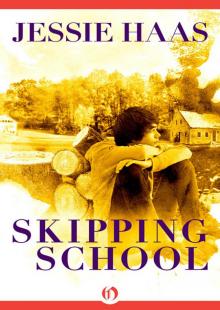 Skipping School
Skipping School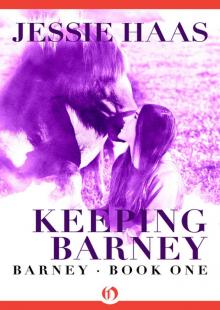 Keeping Barney
Keeping Barney Unbroken
Unbroken Westminster West
Westminster West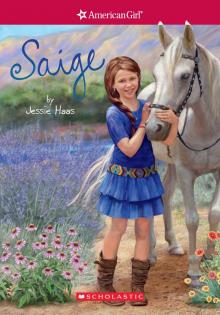 Saige
Saige Beware the Mare
Beware the Mare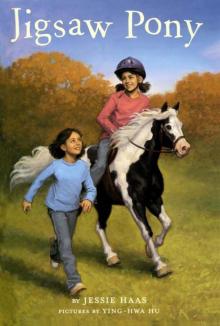 Jigsaw Pony
Jigsaw Pony Rescue
Rescue Saige Paints the Sky
Saige Paints the Sky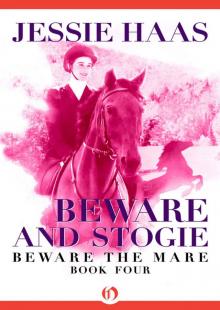 Beware and Stogie
Beware and Stogie Chico's Challenge
Chico's Challenge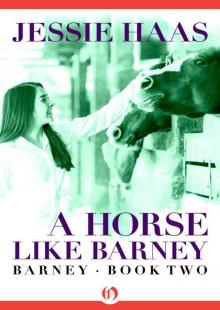 A Horse like Barney
A Horse like Barney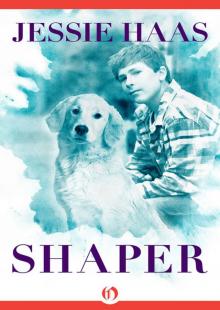 Shaper
Shaper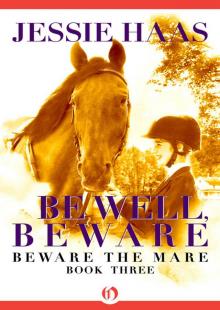 Be Well, Beware
Be Well, Beware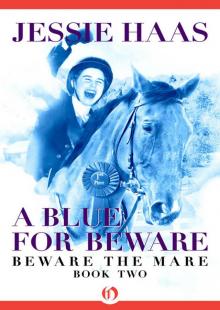 A Blue for Beware
A Blue for Beware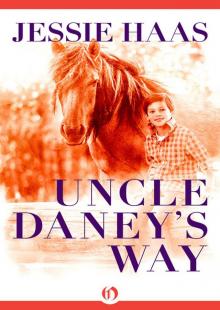 Uncle Daney's Way
Uncle Daney's Way